The views expressed in our content reflect individual perspectives and do not represent the authoritative views of the Baha'i Faith.
All that is in heaven and earth I have ordained for thee, except the human heart, which I have made the habitation of My beauty and glory… – Baha’u’llah, The Hidden Words, p. 31.
Elements attract and combine to form compounds, just like we fall in love.
Chemical bonding illustrates the dynamic of attraction, sacrifice and transformation that constitutes the development of all material phenomenon. Reflecting on that reality can give us useful insights into the mysteries of love that animate hearts and unite the elements, making life as we know it possible. The Baha’i teachings equate the chemical bond that unites the elements with the powerful bond of love:
Love is… the vital bond inherent, in accordance with the divine creation, in the realities of things. …the unique power that bindeth together the divers elements of this material world. – Abdu’l-Baha, Selections From the Writings of Abdu’l-Baha, p. 27.
Comprising 71% of the planet, water is the earth’s most important compound. Water forms when the valence shells—the receptive hearts—of hydrogen and oxygen attract, prompting hydrogen to sacrifice its electrons to oxygen. Subsumed by their desire to unite, the individual elements burn away every individuality in deference to the emergence of a new creation—the water of life.
Invariably, pure-hearted souls respond to the call of love, and false-hearted leaders resist. Jesus uses the Parable of the Tenants to demonstrate how human leaders attempt to thwart the spirit from claiming its home – the human heart.
A man planted a vineyard, rented it to farmers and went away for a long time. At harvest time he sent a servant to the tenants so they would give him… the fruit of the vineyard. But the tenants beat him and sent him away empty-handed. He sent another servant, but that one also they beat and treated shamefully and sent away empty-handed. …“Then the owner of the vineyard said, ‘What shall I do? I will send my son, whom I love; perhaps they will respect him.’ But when the tenants saw him, they talked the matter over. ‘This is the heir,’ they said. ‘Let’s kill him, and the inheritance will be ours.’ So they threw him out of the vineyard and killed him. – Luke 20: 9-19
God is the Planter, the Baha’i teachings say, and the vineyard is the human heart. God’s prophets harvest the fruit of human existence by cultivating humanity’s knowledge of and love for God. As a result, the tenants, the political and religious leaders, persecute them. Indeed, this parable predicts Christ’s crucifixion at the hands of these corrupt leaders.
When the Baha’i Faith began, the return of the spirit of Christ animated hearts, aroused souls and shook Persia to its essence. The fire of the love of God burned so bright that its king, Mohammad Shah, was compelled to determine the truth for himself. He directed the nation’s most illustrious religious leader Siyyid Yaḥyay-i-Darabi, known as Vahid, to determine whether the Bab, Baha’u’llah’s herald and forerunner, was indeed the Promised One. After three thoroughgoing interviews Vahid, the Shah’s most venerable prelate, announced that he had found and fell in love with his heart’s desire—the new Faith of the Bab. When Vahid became a Babi, he was not alone. During the course of the Bab’s six-year ministry, tens of thousands of Persians from all walks of life, from governors to guards, had the same experience.
In 1848 a new King and his Prime Minister, the Amir-Nizam, swept into power. The Amir was determined to quench the fire of the love of God. Jesus explains why some, like the antagonists in the Parable of the Tenants, persecute God’s messengers:
For this people’s heart is waxed gross, and their ears are dull of hearing, and their eyes they have closed; lest at any time they should see with their eyes and hear with their ears, and should understand with their heart, and should be converted, and I should heal them. – Matthew 13:15.
The Prime Minister captured several of the Bab’s followers in the capital, threatening their death unless they renounced their new Faith. One of these was Mirza Ali-Qurban, a man so universally loved by his countrymen that the mother of the Shah and several other state officials interceded on his behalf. The Amir-Nizam remarked:
“I am loth, whether your words be of God or not, to pronounce the sentence of death against the possessor of so exalted a station.”
Mirza Ali-Qurban, whose name means sacrifice, replied, “Are you not aware that all names descend from Heaven? He whose name is Ali (referring to the Bab’s given name Siyyid Ali Muhammad), in whose path I am laying down my life, has from time immemorial inscribed my name, Qurban-Ali, in the scroll of His chosen martyrs. This is indeed the day on which I shall seal with my life-blood my faith in His Cause.”
“Take him away from this place!” cried the Amir. “Another moment, and this dervish will have cast his spell over me!”
“You are proof against that magic,” Mirza Qurban-Ali replied, “that can captivate only the pure in heart. You and your like can never be made to realize the entrancing power of that Divine elixir which, swift as the twinkling of an eye, transmutes the souls of men.” – Nabil, The Dawnbreakers, pp. 451-452.
Mirza Ali-Qurban, like the electrons of hydrogen enamored of oxygen, sacrificed his life to become water for the Tree of Life.


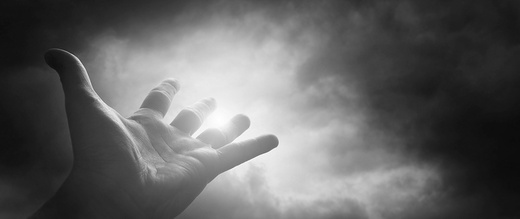






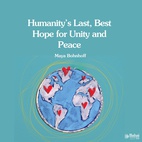
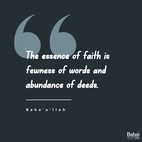
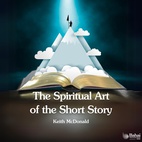



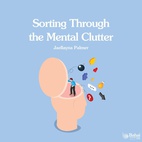

Comments
Sign in or create an account
Continue with Facebookor